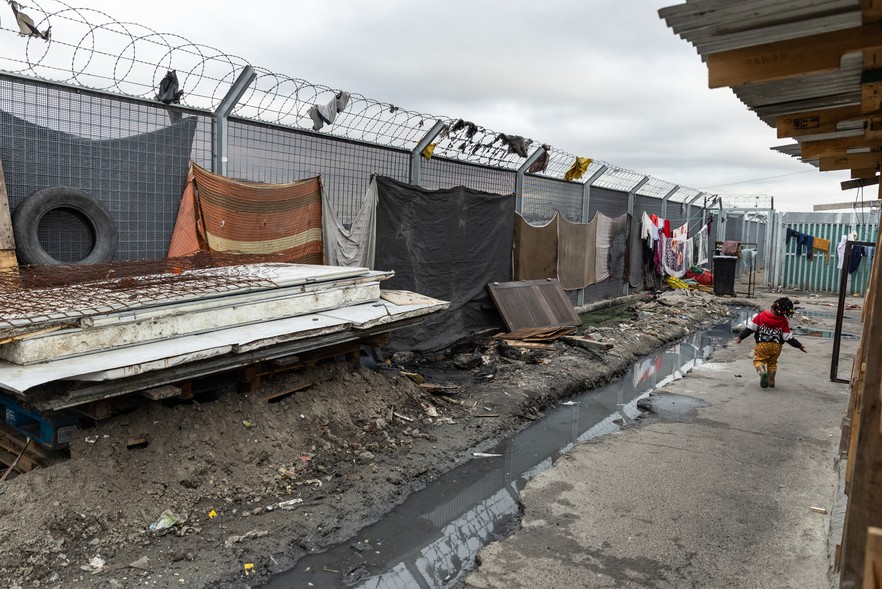
15 August 2025
A group of refugees living at a camp in Paint City in Bellville, Cape Town, say life in the camp has been tough this winter. Photos: Ashraf Hendricks
It’s been a particularly tough winter for Francine Nduyimana, originally from Burundi, and her four children, who live in one of dozens of informal structures at a tented refugee camp in Paint City, Bellville. Her youngest son was born at the site.
The family was among hundreds of refugees who protested outside the United Nations High Commissioner for Refugees (UNHCR) offices in Cape Town in October 2019, demanding to be resettled in Europe or Canada.
While many of the protesters eventually returned to the communities where they had previously lived, two groups have maintained their resettlement demands. Under the covid lockdown, they were moved to sites in Wingfield near Maitland and Paint City in Bellville.
Despite poor conditions at both sites, they still refuse offers of assistance or reintegration with local communities.
Nduyimana says they’ve been struggling with the conditions at the refugee camp for years. But, she says, even these conditions are better than having to cope with the xenophobia of local communities.
“If your child goes to school, they feel unsafe. It is a problem,” she said.
“We are really tired of this situation, but we can’t fight the government. We are waiting for whatever decision they are going to take. They know we have children and are suffering. No one would like to stay in a place like this. But we stay because we have no choice,” she said.
With eviction looming, the mood at the site near the bus terminus in Bellville is sombre.
Dutamo Azazh, from Ethiopia, said they were given the option of repatriation to their home countries, but they have all fled war-torn countries.
“The government must help us go to a safe place. We are not safe in this country. No matter if you have a document, you are a foreigner. They don’t care if you are legal or not.”
“The same government that is blaming us put us here. We need respect and dignity. We want to leave the country,” Azazh said.
Francine Nduyimana and her four children live in one of dozens of informal structures near a tented refugee camp in Paint City, Bellville.
Last month, we reported that the City of Cape Town and the ministers of Home Affairs and Public Works applied to the Western Cape High Court to evict the refugees from the two emergency housing sites.
According to the City’s court papers, in November 2023, an altercation at the camp resulted in a group of around 148 men, women and children being forced to leave the large white tent the state originally supplied. They ended up erecting informal structures on the pavement until the City intervened.
On 27 June 2024, the City conducted a relocation operation to a space adjacent to the tent. When GroundUp visited, we saw portable toilets and a communal tap. There was a stream of dirty water running through the site.
In its affidavit, the City said the conditions are “far from ideal”, with hygiene, vermin, water, damp and sewage “being a big problem, especially in the winter months”.
Dutamo Azazh says they want the government to help them get to a country where they feel safe.
Mayor Geordin Hill-Lewis said that the Bellville camp has caused “severe traffic and taxi chaos” and “increase in crime and extensive vandalism of the surrounding areas”. To date, the State has spent more than R30-million, mostly on rent for the tents and the cleaning of mobile toilets.
City spokesperson Luthando Tyhalibongo told GroundUp that the final date for the eviction hearing would only be settled once the Sheriff has served a notice.
“Remaining occupants at Paint City and Wingfield will be expected to reintegrate back into local communities, or take the option of repatriation. To date, the fears of widespread xenophobic violence cited in the original occupation demands have not materialised,” he said.
Last month, Jan De Bisschop at the UNHCR in Pretoria told GroundUp that resettlement to a third country is a “very limited option globally and for the most vulnerable refugees”. In 2024, under UNHCR’s mandate of 31-million people, only 188,800 persons were resettled in a third country, less than 1%.
A woman walks through the tightly packed homes at the Paint City refugee camp.